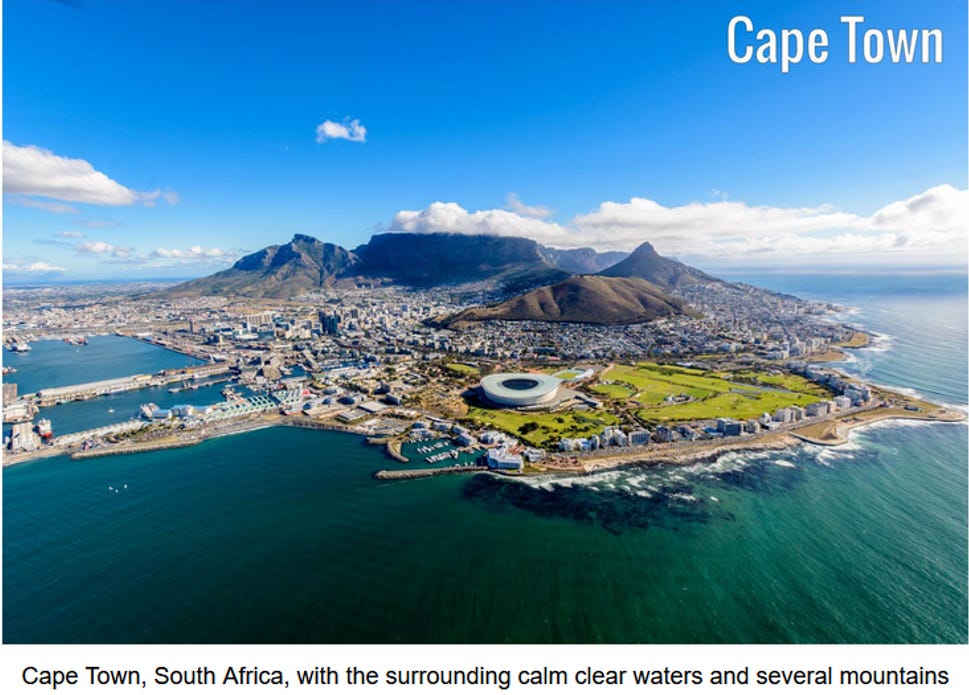More than 60 years ago, Rev. J.H. Traugott wrote: “Jesus Christ did not come to make life easy but rather to make men great.”
CAPE TOWN IS NAMED THE BEST CITY IN THE WORLD. [Direct extracts from |Businesstech.co.za]
Cape Town has been named the best city in the world by Time Out. After finishing in second place in 2024, Cape Town claimed the number-one spot for 2025 in the British-based company’s rankings. The results were based on opinions from 18,500 people around the world in the seventh Time Out global survey of city-dwellers.
The survey’s questions covered a broad range of subjects, from food, nightlife and culture to affordability, happiness, and overall city ‘vibe’ [Ed: Capetonians are all about the ‘vibe’]. The British-based publication said that Cape Town’s rise to number one was no surprise because locals and visitors enjoy visiting the colony of African penguins, tasting world-class wines, enjoying strolls on the beaches, and visiting one of the world’s coolest neighbourhoods, East City.
The city is also renowned for its historic sites and cultural hubs. Time Out also has a presence in the city, with the Time Out Market situated in the V&A Waterfront. After losing the title to New York in 2024, the Mother City faced intense competition from Bangkok (#2), The Big Apple (#3) Melbourne (#4), and London (#5). Cape Town scored highly across 44 different criteria used in the survey, with 82% of Capetonians describing their city as beautiful, and 97% of locals saying it makes them happy.
No other Southern African city made the top 50, with only Marrakech in Morocco (#32) and Lagos in Nigeria (#41) making the top 50. “Cape Town is a city built on its people’s passion, resilience, and creativity. From bustling markets to serene beaches, every corner of our city tells a story of community and connection,” said Enver Duminy, CEO of Cape Town Tourism.
“This recognition speaks volumes about the incredible spirit of Cape Town,” added James Vos, City of Cape Town’s Mayoral Committee Member for Economic Growth. “From our stunning landscapes to our awesome communities, it’s no wonder we’re considered the best. This is a shared achievement, and we’re excited to continue growing and attracting visitors from around the globe to experience everything we have to offer.” The global top 10:
- Cape Town, South Africa
- Bangkok, Thailand
- New York, USA
- Melbourne, Australia
- London, England
- New Orleans, USA
- Mexico City, Mexico
- Porto, Portugal
- Shanghai, China
- Copenhagen, Denmark
The Climate in Cape Town is attractive. This prime location, near the southernmost point of Africa, Cape Town enjoys a Mediterranean climate, with north European characteristics, reflecting a medley of contrasting seasons with short, wet winters and long, warm, and dry summers. The monthly temperatures average 22-26°C and fall to 10°C-18°C minimum. Humidity remains subtly consistent around 70%-74%. Visibility holds steady at a comfortable 10km throughout the year, irrespective of the season. Rainfall ranges from 7mm in February to 98mm in June. Wind is a breezy 13km/h in winter to a gusty 17km/h during January‘s peak and known locally as the “Southeaster”. 300 days of sunshine a year offers 10 hours in winter June and July to 14 hours peaking in December.
The best time to visit Cape Town is the sunny period from January to March. Sunshine increases overall enjoyment during these months, as it averages between 9 to 11 hours per day, with the opportunity to engage in all sorts of outdoor activities, visit city attractions, and explore scenic coastlines.
The worst time to visit Cape Town is from May to August. Whilst the beauty of Cape Town rarely fades, the winter weather might not be to everyone’s liking. These are Cape Town’s coldest months and rainfall is maximum during these months, peaking in June with 70mm in August..
Spring weather in Cape Town ushers in a delightful spring season, from September to November. Temperatures are an agreeable 18°C-22°C with rainfall tapering off from 37mm in September to an agreeable 16mm by December. Visitors can enjoy longer daylight hours, from 12 hours in September to 14 hours in November.
The Summer weather, from December to February, with temperatures peaking at 26°C in January and February and rainfall is minimal, confined to short localised showers and providing sun-worshipers with a steady 11 hours of sunshine each day.
Autumn weather in Cape Town is from March to May, when temperatures start to cool, falling from a high average of 25°C in March to 20°C in May. Night lows also fall, reaching from 15°C to 13°C, but despite the increasing rainfall the city remains fairly sunny with an average of 8 hours of sun per day
Weather in Cape Town‘s winter, from June to August, is characterised by cooling temperatures and increased rainfall. High temperatures typically reach 17°C, while lows fall to 10°C. This season has the most rainfall, peaking in June at 98mm. Despite the shorter days and longer nights, with 10 hours of daylight, sunshine still manages to break through, with an average of 6 hours sun per day.
BUT some residents in Cape Town and the Western Cape are suffering, mainly the younger generation, who see the opulence around them and desire it. The quickest way to achieve this is through crime, or to borrow lots of money, (Spoiler Alert: Not a good idea unless it can be managed effectively). “The proportion of their take-home pay which applicants need to service their debt is very high compared to many other countries at 68%. That’s gone up in the past two quarters.” Source
- Many South Africans are drowning in debt – often due to a bad move in their twenties https://www.news24.com/fin24/consumer-lookout/many-south-africans-are-drowning-in-debt-often-due-to-a-bad-move-in-their-twenties-20250206?lid=veepjko8d5uh
BUDGET SPECIAL – TAXATION THROUGH INFLATION: The new budget’s fiscal drag may hurt some more than VAT
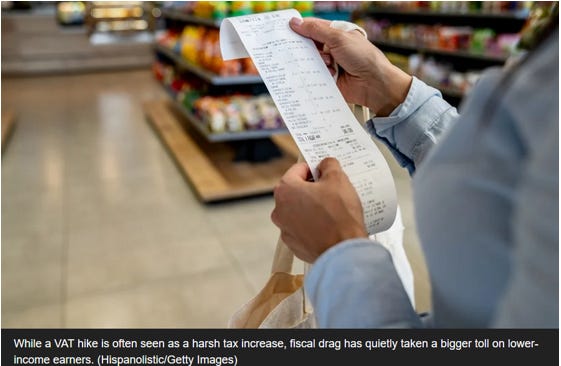
Despite Treasury’s acknowledgement that increasing personal income tax is no longer an effective way to increase revenue, the additional taxes paid by personal income taxpayers have increased by R34 billion over the last two years. This year, the government will generate R18 billion of revenue through ‘fiscal drag’. This means that neither the tax brackets, nor the primary rebate, will be adjusted for inflation and a person receiving an inflation-adjusted salary will pay more tax even though their buying power has not increased (UK does the same).
Last year, Treasury did not adjust the tax tables, resulting in individual taxpayers paying R16 billion more in tax. Together with this year’s tax proposal, personal income taxpayers are effectively paying R34 billion more in tax than they were in 2023. The question is whether this “taxation through inflation” has been worse for lower-income earners than a two-percentage-point increase in VAT? Sources
- Taxation through inflation: The new budget’s fiscal drag may hurt some more than VAT https://www.news24.com/fin24/economy/taxation-through-inflation-the-new-budgets-fiscal-drag-may-hurt-some-more-than-vat-20250313?lid=6qaiznsuoxg2
- 0.09% of South African companies pay 72.3% of all corporate income tax https://businesstech.co.za/news/budget-speech/817005/0-09-of-south-african-companies-pay-72-3-of-all-corporate-income-tax/
WHAT IS THE WESTERN CAPE WITHOUT WINE? The proposed excise tax increase could harm an industry that contributes significantly to SA’s cultural heritage
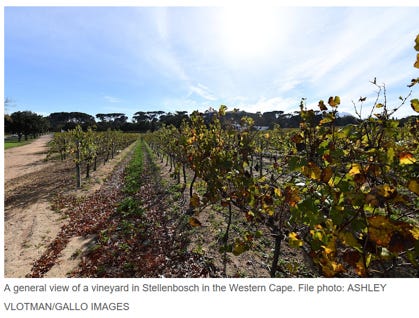
Ever since the first black South Africans started graduating in winemaking, from Stellenbosch University in 1995, the tendrils of hope have been nurtured and the children of farmworkers have been able to dream bigger dreams of a better future. Now, our wine farms are at a critical juncture that threatens this transformation and the entire industry, an increased excise tax has been proposed by finance minister Enoch Godongwana. Source
FUN TIDBIT –
STOP PRESS – FISCAL BUDGET: ANC REJECTS DA PROPOSAL INDICATING A POSSIBLE COLLAPSE OF THE GNU
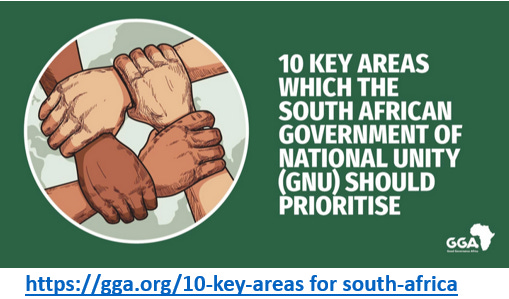
DATELINE February 19, 2025: The rand weakened significantly following the unprecedented cancellation of the budget speech, highlighting cracks within the Government of National Unity (GNU). The speech, which was set to announce a major increase in VAT was cancelled at the eleventh hour following disputes about tax hikes, marking the first time in democratic SA that the budget speech was delayed, sending markets into panic. Now (April 4) Trump’s Tariffs are causing global market turmoil
The GNU must cooperate on these 10 key points, and engage in effective negotiations, especially between the ANC and DA, but not excluding the smaller parties. It’s the only way to go forward, yet politicians around the world practice ‘power politics’ to the detriment of everyone. As most voters know, these immature ‘leaders’ need to move from their ‘child ego mode’ to that of ‘adult mode’. This is simple Transactional Analysis, but they never seem to learn! However, the Chinese do actually learn well because they are ‘grownups’!
UPDATE 1: DA ISSUES A WARNING TO THE ANC (March 29)
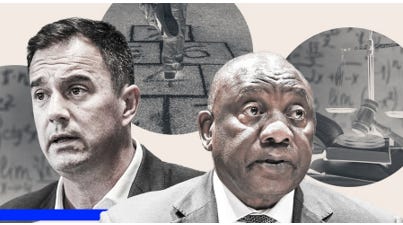
South Africa’s Democratic Alliance (DA) criticised the African National Congress for its reluctance to share control of economic policy, escalating an impasse over the budget that’s strained relations between the two biggest parties in the nation’s coalition government (GNU). The ANC balked at a proposal by the DA to share the management of economic policy, reported by News 24.
The rejection of the plan risks leading to a collapse of the Government of National Unity (GNU), citing an anonymous DA negotiator. The rand fell as much as 1.1% against the US dollar at the time and traded even weaker last week at 19.08 per USD (24.78 GBP).
UPDATE 2: ALTERNATIVES TO THE VAT INCREASE
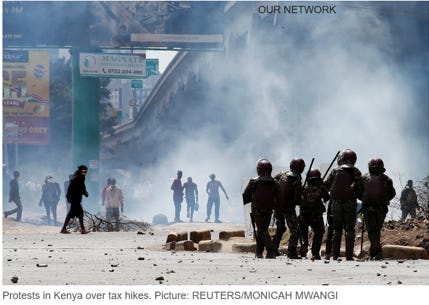
Any VAT increase, no matter the percentage margin, will have a serious negative effect on the most vulnerable South Africans, the majority of whom are rural and urban working class poor households. This is because, while the VAT increase would be lower, the allocation to social grants, the primary source of income for many poor households, over the medium term is also lower by R15bn compared to finance minister Enoch Godongwana’s first proposed budget.
VAT is SA’s second-largest source of tax revenue, contributing about R400bn annually, or about 30% of total tax revenue, according to the National Treasury. The lower increase in the VAT rate is partially compensated by across-the-board freezes in personal income tax brackets. Whilst these brackets have in the past been adjusted for inflation, the move to freeze all brackets is an untargeted approach and means individuals in lower-income tax bands will also face higher taxation. This, together with the proposed VAT increase, places an undue burden on poor and lower-income households.
SA’s official unemployment rate stands at 32%, but if discouraged job seekers are included the expanded definition exceeds 40%, according to Stats SA. The average South African earns about R14,000 a month, yet a large portion of the population earns less, with about 18 million individuals depending on social grants
Fifteen years ago a wave of revolt spread across the Arab world from Tunisia to Egypt, Syria and Yemen. The People rose up to protest against authoritarianism, corruption, poverty and the mismanagement of the economy. When Kenya tried to impose tax hikes in 2024 through the Finance Bill, Kenyans took to the streets, with some storming parliament, forcing President William Ruto to withdraw the bill.
Is it time to impose a wealth tax on high net-worth individuals through a progressive tax on assets exceeding R20m-R50m? This could generate additional revenue without harming low-income consumers. Unless the ANC considers alternative sources of funding, as proposed above, when the National Treasury tables its budget with its 0.5 percentage point increases, all pro-poor and working class-biased political parties, led by the EFF, will vote NO. The EFF has declared 2025 the year of the picket lines, underlined by grassroots activism and community mobilisation until this anti-black, anti-poor and neoliberal regime is removed from office. Read more details and options for the Budget HERE.
UPDATE 3 – April 2, 2025 PARLIAMENT ADOPTS 2025 BUDGET FRAMEWORK
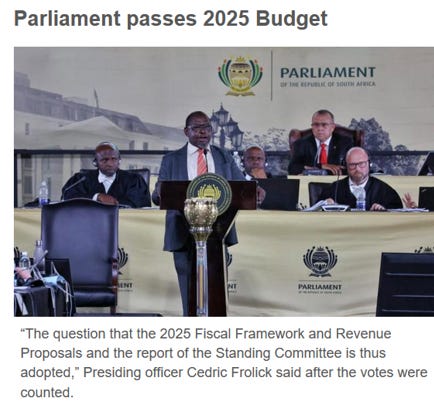
Parliament has voted to adopt the 2025 Fiscal Framework and Revenue Proposals, following a debate in the house, cited by government: https://www.sanews.gov.za/south-africa/sas-senior-delegation-meet-us-officials-address-expropriation-equity-laws
HOWEVER, AT LEAST WE HAD A HOLIDAY ON FRIDAY, MARCH 21, 2025
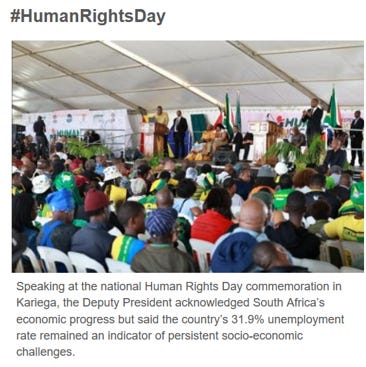
BUT are ‘Human Rights’ effective in SA? South African Constitutional Court: “Kill the Boer, Kill the Farmer” found it’s “Not Hate Speech”. Is Trump right about SA?
“AfriForum’s Ernst van Zyl interviewed experts about racially discriminatory legislation and the threats to private property in South Africa, to determine whether US President Donald Trump’s recent claims about South Africa are fact or fiction.”
The South African Constitutional Court has rejected a lawsuit by civil rights org AfriForum against the song “Kill the Boer” as sung by the Marxist “Economic Freedom Fighters” (EFF), saying it has “no reasonable prospects of success.” The Trump administration has cut all aid and military assistance to South Africa over its blatantly racist and discriminatory laws.
According to the Sunday Times, the Trump administration has cut military assistance and cooperation with the South African National Defence Force (SANDF), expelling its military attache Brigadier Gen. Richard Maponyane. The paper cited a memo dated March 13 from the US State Department to Aaron Harding, the CFO of America’s Defense Security Co-operation Agency (DCSA). Any South African military personnel in the US for training will be returned to South Africa, Business Insider reported.
EFF leader Julius Malema called everyone who complains of a “white genocide” in South Africa “racist” and told them to leave the country before singing the “struggle song” Kill the Boer, Kill the Farmer with a crowd of 60,000 dancing supporters on “Human Rights Day” March 21. A 30-year old farmer was tortured to death by three men in police uniforms the next day. In his book “Kill the Boer: Government Complicity in South Africa’s Brutal Farm Murders“, author Ernst Roets has demonstrated how singing of the song “Kill the Boer” at rallies coincides with spikes in farm murders.
AfriForum CEO Kallie Kriel said that after the end of Apartheid 1994, the impression was created that the Constitutional Court would protect human rights, including the human rights of Afrikaners. “After this shocking court ruling, we see that this is no longer the case. We are seeing an increasing radical implementation of the Constitution. We see an increase in ideologically driven judges. However, we are not going to become discouraged. We take clear notice of this, we also take notice of the fact that President Cyril Ramaphosa and the government do not want to condemn the statements of ‘Kill the Boer’,” Kriel said.
The Democratic Alliance (DA) party called the court decision “unacceptable and divisive.”
“The inflammatory “Kill the Boer” chant has no place in our society, regardless of any legal ruling on its constitutionality. The fact that this song continues to be sung by Julius Malema and other political figures is deeply troubling and unacceptable,” the DA stated, noting the song “incites violence, stokes hatred, and deepens divisions within our society. We should be working towards unity and healing, and songs like this only serve to deepen the rifts that still exist in our country.” Sources
- “The ANC continues to cynically attempt to direct everyone’s eyes to the rear-view mirror, while simultaneously championing its own laundry list of race laws https://www.thegatewaypundit.com/2025/03/south-african-constitutional-court-kill-boer-kill-farmer/?utm_source=substack&utm_medium=email
- South Africa’s Highest Court Denies Bid To Have ‘Kill The Boer’ Declared Hate Speech https://www.zerohedge.com/political/south-africas-highest-court-denies-bid-have-kill-boer-declared-hate-speech
NEWS FLASH – SA’S MISTREATMENT OF ITS WHITE MINORITY
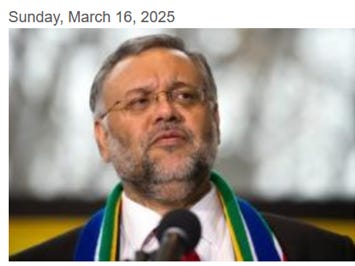
US President Donald Trump’s attacks on what he alleges is SA’s mistreatment of its white minority are being met with mockery on social media by some white South Africans poking fun at their own ‘privilege’. Trump’s offer to rehouse white South Africans as refugees fleeing persecution may not spur the rush he anticipates; he has no idea of life in South Africa, as indeed do few pople in the developed world.
The expulsion of SA ambassador to US is ‘regrettable’, said the Presidency. The Presidency remains committed to building a relationship with the United States of America (USA), despite the “regrettable” recent expulsion of SA Ambassador to the US, Embrahim Rasool. He was expelled after US Secretary of State, Marco Rubio, took to social media, X, to declare that Rasool was not welcome in the US.
“South Africa’s Ambassador to the United States is no longer welcome in our great country. We have nothing to discuss with him and so he is considered persona non grata” [person not welcome] (sic),” Rubio post reads on social media. The Presidency noted the regrettable expulsion of Rasool and urged all relevant and impacted stakeholders to maintain the established diplomatic decorum in their engagement with the matter. “South Africa remains committed to building a mutually beneficial relationship with the United States of America,” the President said. [SAnews.gov.za]
THIS IS WHAT I HAVE BEEN SAYING ALL ALONG! In spite of Trump’s threats, SA can boost mineral beneficiation through the EU and China. SA should focus on its own development and avoid the neocolonial economic model (captured by the DA). SA is not hugely dependent on USAID, but some fear the country’s preferential trade status under the US ‘African Growth and Opportunity Act’ (AGOA) could be next. AND Business Day agrees with my assessment! [Thando Maeko Political Reporter] SA looks to Asia and the Middle East to counteract the effects of Trump’s tariff tirade.
SA has projected itself as “non-aligned” in geopolitical conflicts, and has sought not to tie its interests too closely to those of the main superpower rivals, the US, EU, China and Russia, vying for influence on the continent. SA resisted Western pressure to isolate Russia over Ukraine, and took the risk of upsetting the US, (Israel’s puppet), when it brought the ICJ case over the war in Gaza. Lamola said SA would continue to seek talks with the US, “but we have to face reality that we have to plan for all scenarios”. He reiterated that SA’s land reform policy and its genocide case against Israel at the ICJ were “non-negotiable”.
Minister of international relations and co-operation, Ronald Lamola said that the US had not responded to attempts to discuss President Donald Trump’s executive order cutting off aid, but China had pledged support. Trump cut US financial assistance last month, citing disapproval of SA’s land reform policy and genocide case against Israel at the International Court of Justice (ICJ).
“Despite all our attempts through our mission in Washington to formally engage and communicate, we are awaiting feedback and a response. We’re hopeful they will find a moment to have the discussion with us,” Lamola told Reuters in an interview in Johannesburg. Lamola said SA was setting up bilateral meetings to shore up support with a number of countries, including China.
“[China said] they are in solidarity with us and stand ready to pledge support in terms of whatever trade relations and challenges they can,” he said. SA hosted the G20 meeting of foreign ministers in Johannesburg recently. US secretary of state Marco Rubio will not attend after he expressed disapproval with SA’s G20 theme: “Solidarity, Equality, Sustainability”.
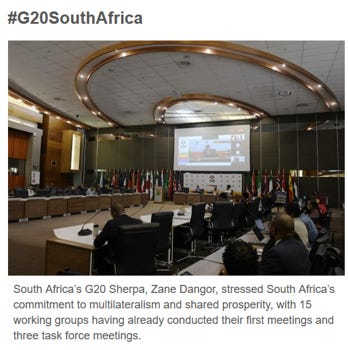
However, the EU affirms a strategic partnership with SA. Amidst the changing geopolitical chessboard, European Council President António Costa has emphasised the importance of the strategic partnership between South Africa and the European Union (EU). Addressing the opening of the 8th South Africa-European Union (SA-EU) Summit, Costa said the EU and South Africa are not just partners but are strategic allies, bound by shared values of democracy, human rights, rule of law and multilateralism.
“The world has changed profoundly in these past seven years. Pandemics, conflicts in Africa, in the Middle East, and in Europe. Multilateral commitments are being tested, and the post WW2 US ‘rules-based international order’ faces growing challenges” [Ed: as it should!] “Through this we aim to consolidate cooperation in areas such as science and technology, education and skills development, climate action, peace and security, health and critical minerals,” the President said. Source SAnews
THOUGHT FOR THE WEEK – Is Digital ID for SA worth it? Risks & Opportunites
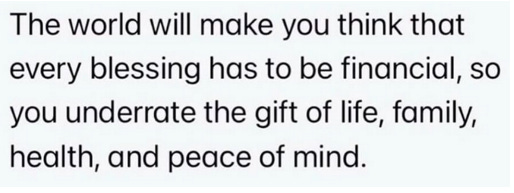
President Cyril Ramaphosa announced South Africa’s plans to invest in digital infrastructure to expand access to government services. Presenting his State of the Nation Address on Thursday, February 6, 2025, Ramaphosa said this would include revamping the gov.za platform and launching a digital identity system. “As we work to reform the public service and build the capability of the state, we will harness technology to transform the way government works,” he said.
“We will invest in digital public infrastructure to give South Africans access to government services, anytime, anywhere, through a relaunched gov.za platform.” “At the heart of this transformation will be the implementation of a digital identity system,” Ramaphosa added.
- Source: Digital identity system for South Africa https://mybroadband.co.za/news/government/581567-digital-identity-system-for-south-africa.html?utm_source=everlytic&utm_medium=newsletter&utm_campaign=businesstech
BREAKING SOUTH AFRICAN NEWS:
MEDIUM-TERM DEVELOPMENT PLAN (MTDP) 2024–2029 FINALISED
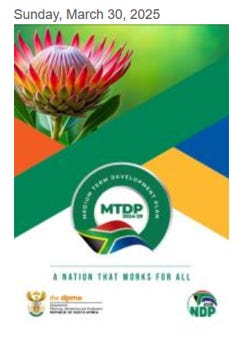
The Department of Planning, Monitoring and Evaluation has announced that the Medium-Term Development Plan (MTDP) 2024–2029 has been finalised, providing a strategic framework to guide South Africa’s development priorities over the next five years. “Announced as the foundation of government’s programme of action in the recent State of the Nation Address, the MTDP 2024-2029 integrates the Government of National Unity’s (GNU) ‘Statement of Intent’ with the ‘National Development Plan 2030’ (NDP 2030) to drive inclusive growth, improved service delivery, and better living conditions for all citizens,” the department said.
The MTDP 2024-2029 was developed through an extensive participatory process involving government, experts, and stakeholders to ensure evidence-based planning and effective implementation. It follows a whole-of-government approach, ensuring that national, provincial, and local government structures are aligned in their priorities, budgets, and delivery mechanisms.
“The plan is now available for stakeholders and the public to access, as government moves towards implementation and monitoring progress. Collaboration from all sectors of society is encouraged to ensure the successful execution of the plan’s priorities and targets,” the department said. For more information and access to the MTDP 2024–2029, visit www.dpme.gov.za
SURVIVAL MONITOR – AS GLOBAL TENSIONS ESCALATE, THE QUESTION OF ‘SELF-SUFFCIENCY SURVIVAL’ BECOMES PARAMOUNT. In America, this is what has changed during the last 30 years:
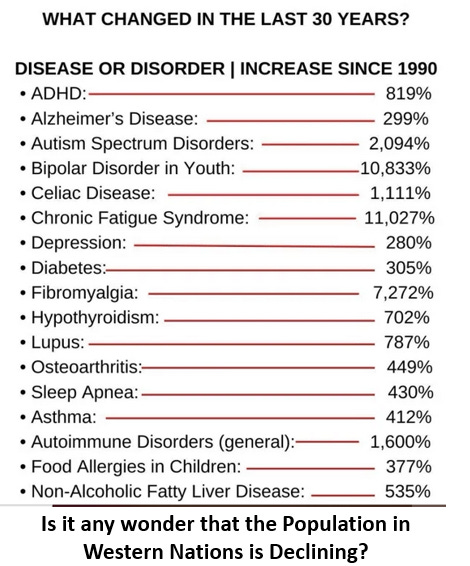
INFLATION – CPI remained unchanged in February
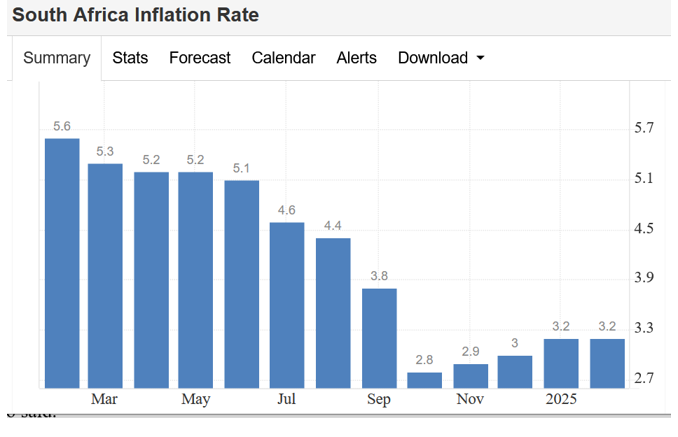
SA Director: CPI Operations, Lekau Ranoto, said. The annual rate for food and non-alcoholic beverages accelerated to 2.8% in February from 2.3% in January.
“Fruit and nuts, vegetables, hot beverages, seafood, meat and cereals recorded higher rates. Cold beverages milk, dairy and eggs, oils and fats, sugar confectionary and desserts witnessed slower price increases,” she said.
Ranoto said inflation in maize meal, a staple in South African households, reached a 17-month high, with samp inflation also reaching a 19-month high in February. “The rise in prices is driven by inflationary pressure from farming and the manufacturing of maize according to the latest producer price index data. On average, consumer prices for meat stayed the same in February, compared with January, resulting in a monthly change of 0%. The annual rate was also 0%. “While meat remained subdued, inflation for hot beverages continues to accelerate. The annual change in the price index for hot beverages was 14.6% in February, up from 13.7% in January,” Ranoto said. Meanwhile, Stats SA has also recorded a 10.5% increase in medical aid premiums this year and health services rose by 6.1%, compared to a 5% rise last year. [SAnews.gov.za]
FINALLY – I can vouch for the truth of this statement…from personal experience over 60 years:
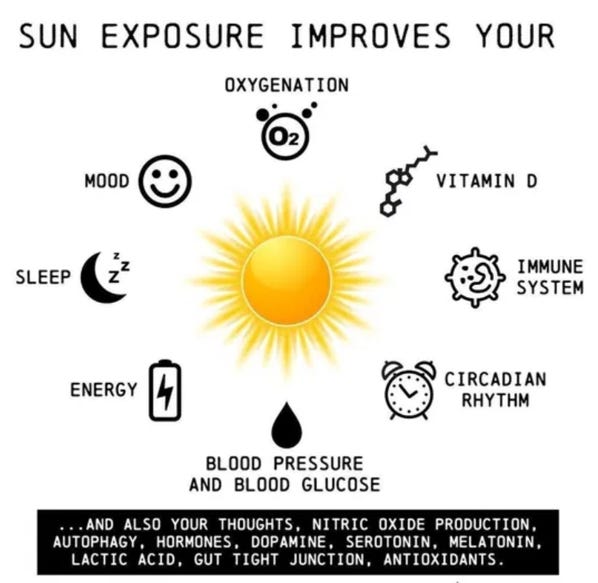
REMEMBER – PRAYER WORKS!
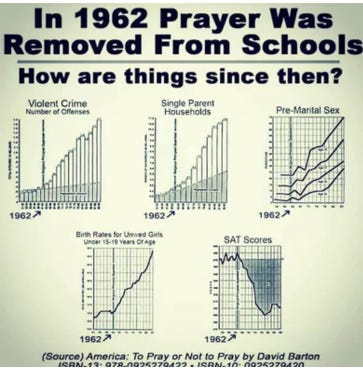
COMING NEXT:
- BOOM Weekly Global Review – Tuesday, April 6, 2025
- The Financial Jigsaw Part 2 – Chapter 10 (43) – DEATH OF GLOBALISM? – Saturday, April 12, 2025
REFERENCES
- My Book: “The Financial Jigsaw” Parts 1 & 2 Scroll: https://www.researchgate.net/publication/358117070_THE_FINANCIAL_JIGSAW_-_PART_1_-_4th_Edition_2020 including regular updates.
- BOOM Finance and Economics Substack (Subscribe for Free) – also on LinkedIn and WordPress. Plus Covid Medical News Network CMN News and BOOM Blog — All Editorials (over 5 years) — BOOM Finance and Economics | Designed for Critical Thinkers — UPDATED WEEKLY (wordpress.com)
